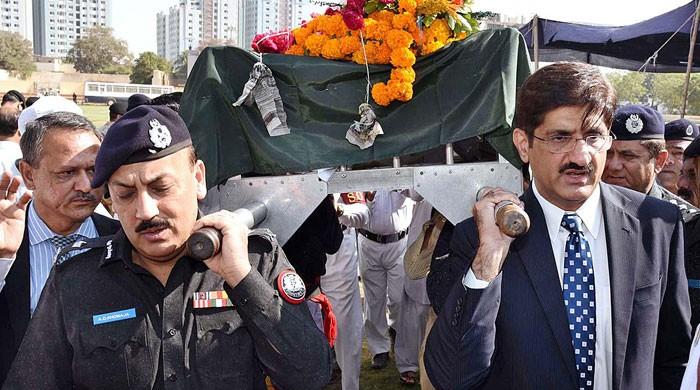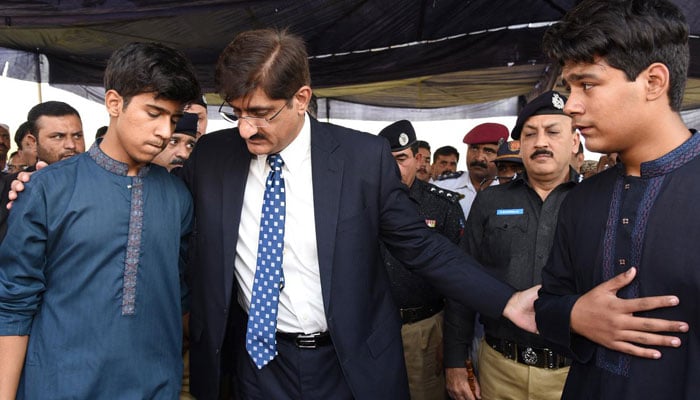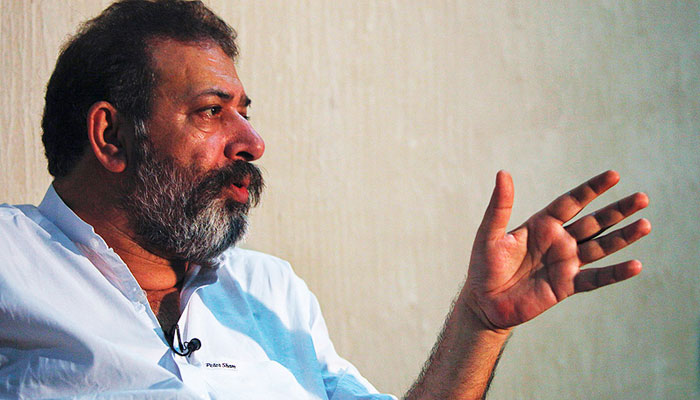Dawood Ibrahim
SENIOR MEMBER

- Joined
- May 25, 2016
- Messages
- 3,475
- Reaction score
- 3
- Country
- Location

January 22, 2017
PAKISTAN

Photo from Nov 28, 2016 shows Shindh Chief Minister Murad Ali Shah carrying the coffin og slain DSP Fazi Ali Shaigri for funeral prayers
The death of a deputy superintendent of police in Karachi nearly three months ago left his widow with nothing but false promises, entangled in bureaucratic red tape. Despite the fact that her husband's funeral was attended by the Chief Minister, the Inspector General of the Police, and many other high-ranking officials, her desperate plea for help and compensation fell on deaf ears.
Hers is not the only case. Families of many martyrs among the security forces face real hardship to get their legal rights.
The Sindh Compensation of Shaheed Act, 2014 had promised speedy relief to the families of the martyred law enforcement officials, and particularly police officers, who had laid down their lives in the line of duty. Under the Act, the slain officer's family would be given land, two of his children would be employed, and the monthly salaries would continue, along with a compensation package announced by the police or government.
It was an encouraging move on part of the previous government which acknowledged the sacrifice and bravery shown by police officers who had been at the forefront of the war against criminal elements, particularly for the last 15 years. Since then, some figures estimate that 15,000 people, including thousands of policemen, have been killed in Karachi alone in ethnic, sectarian and political violence.
It has been two years since the Act was passed. Yet, there is a lack of will to implement it, and an utter disregard by the bureaucracy which often causes obstacles to ensure smooth payment of compensation.
Often, the families of the departed soldiers would be found hoping against hope, standing outside the offices of home department, police department, or in the courts, seeking relief and pleading for salaries of their loved ones who laid down their lives to protect the people.
Many of them avoid speaking to the media out of fear as it could jeopardize their efforts to get compensation entitled by the law.

Photo from Nov 28, 2016 shows Shindh Chief Minister Murad Ali Shah consoling the sons of slain DSP Fazi Ali Shaigri
The wife of the DSP Faiz Ali Shigri, who was killed in November last year, wrote to the authorities to claim the compensation package. But come January, she neither got the reward that was promised nor the security for the family as entitled under the law or even otherwise in wake of threats.
In the letter to Sindh’s top cop, AD Khwaja, dated January 7, 2017, she pleaded: "You, along with the CM, were kind enough to assure us all possible help and assistance at the funeral prayers of my slain husband, who embraced Shahadat on Nov 27. I live with three children and due to observance of iddat, could not move around. I request you to provide me security as we are under threat."
In her second plea she requested a flat in the police building located in Saddar, as she felt insecure in her current residence in the Gulshan-e-Iqbal area of the city.
During her iddat period, she was asked by the department to provide an original 'death certificate', post-mortem report, copy of CNIC of both the Shaheed and the widow, and family registration certificate from NADRA. The department could have fulfilled most of these requirements on their own without bothering a grieving widow.
There are numerous stories of similar nature where Shaheed families suffered in clear violation of the Act. In another case, the son of a police constable lost his legal battle of getting a job after being told in December 2016 that he was over-age, whereas the fact that his application remained unattended for three years went unheeded, simply because he didn't have enough money to bribe the concerned officers who'd arrange to process his job application. Today, he is selling sweet potatoes near his town in interior Sindh.

SP CID Chaudhry Aslam was assassinated on 9 January 2014 in a bomb blast targeting his convoy on the Lyari Expressway in Karachi
Even in a high profile case as that of the top investigator and officer of the Central Intelligence Department, late Choudhry Aslam's family also suffered. One of his colleagues disclosed that even when he was alive and his house was attacked by a suicide bomber in late 2011, he was accommodated from a 'secret fund' only after he used political influence.
The Sindh Compensation Act was invoked to ensure that the government and department would look after the families of martyrs and would give them jobs, salaries, rewards and plots, but, the suffering of the families after Shahadat of their loved ones paint a sorry picture.
Perhaps with the exception of the military institution, civilian security departments almost always have had to rush from pillar to post just in order to get what they are promised by law.
Whether it is operation 'Zarb-e-Azb', the Karachi operation, or the National Action Plan, this aspect cannot be ignored. Families of the martyred expect more than just words form the provincial government.
—The writer is the senior columnist and analyst of Geo, The News and Jang
